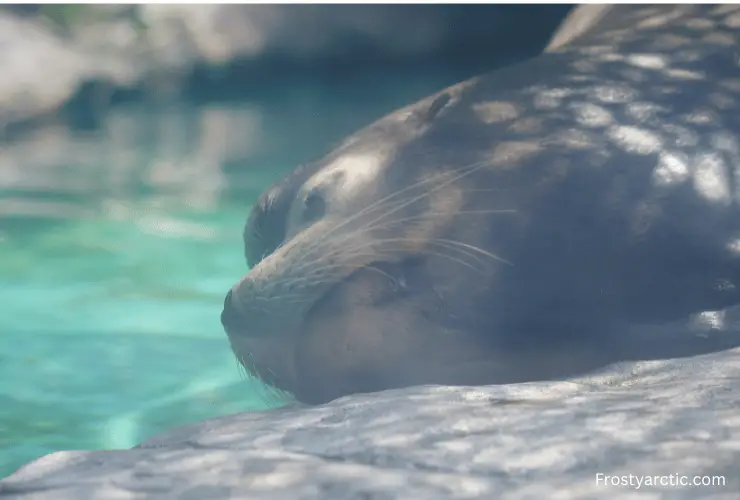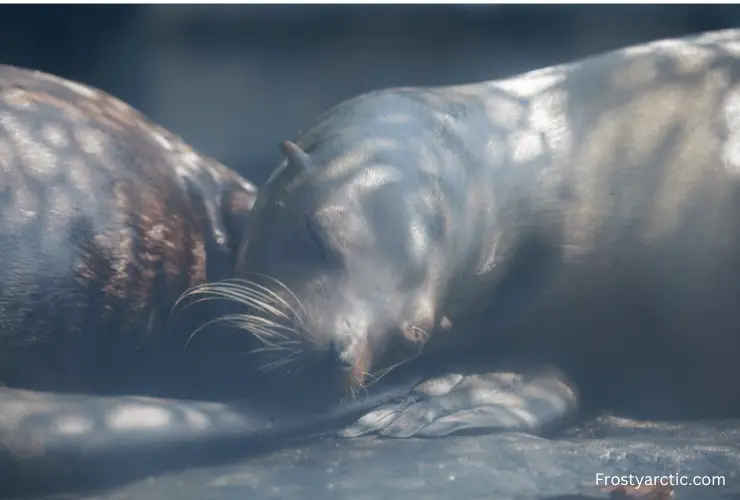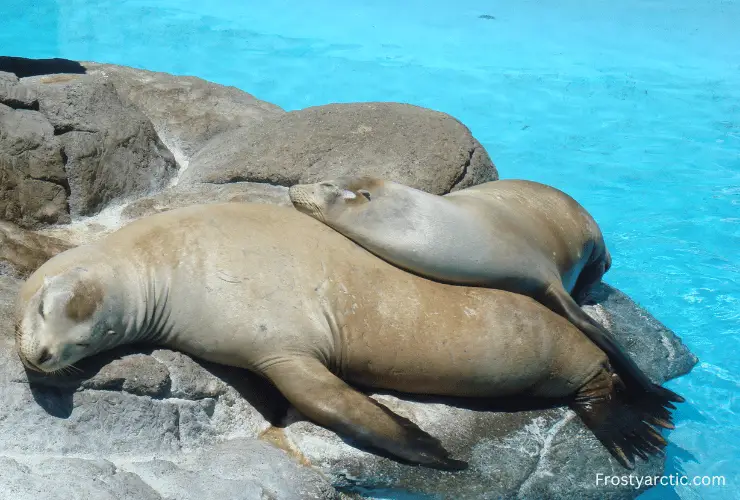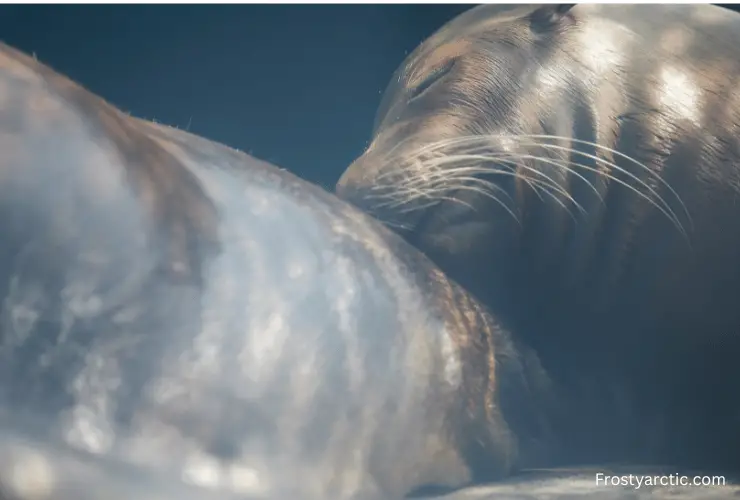Yes, Sea lions can sleep underwater. These incredible creatures can shut down half of their brains at a time. It allows them to rest and sleep while remaining alert to potential dangers in the water. Sea lions can stay and sleep underwater for up to 20 minutes (short interval sleep of a few minutes).
Sea lions have adapted to life in the water. Their sleeping patterns reflect this. They typically sleep in short bursts throughout the day and night. Their sleep can be influenced by factors such as water temperature, depth, and the presence of predators.
So, if you’ve ever wondered whether sea lions can sleep underwater, the answer is a resounding yes! But there’s still so much more to learn about these cute creatures. Why do they sleep underwater? How much time can they stay underwater? To find out, read on and discover the incredible world of sea lions!
Do Sea Lions Sleep Underwater?

Sea lions sleep both on land and underwater. Sea lions may adopt a standing position or float horizontally on the surface when they sleep in the water. This allows them to conserve energy and stay underwater for longer periods.
Ecomare’s writers have described the following facts about its sleepy underwater pattern: (source)
“Unlike when hunting for food, sea lions do not need to actively swim while sleeping. It allows them to remain submerged for up to 30 minutes (Although the average is around 15 minutes). These incredible adaptations help sea lions survive in their ocean habitat. It makes them truly fascinating creatures to observe.”
Air-breathing animals face challenges when sleeping in water. However, they are adapted to maintain postures or motion to prevent excessive heat loss or overheating. This is especially relevant to sea lions. These are semi-aquatic mammals known for their ability to sleep underwater for extended periods.
The NCBI platform published a review. The review highlights unique adaptations of aquatic and semi-aquatic mammals. Sea lions are one such mammal. These adaptations enable them to sleep in water and on land.
The adaptations involve maintaining certain postures and motions. The goal is to prevent excessive heat loss. It also allows for alertness to potential predators in the water.
Did you know the sleeping pattern of sea lions? Their sleeping pattern is not like humans, as we can sleep for 7 to 8 hours at a time. They even alternate between deep and shallow sleep, with one eye open or half open.
How Long Do Sea Lions Sleep Underwater?

Sea lions sleep for about 20 minutes underwater. They cannot sleep for hours underwater. According to a study, they do not sleep underwater for extended periods, but they can hold their breath for up to 20 minutes while resting and sleeping. Here extended periods mean they cannot sleep for hours underwater. Here are some reasons why:
- Sea lions need to surface to breathe: Sea lions are mammals. They require oxygen to survive. So, they cannot sleep underwater for long periods without surfacing to breathe.
- Sleep is important for survival: Sleep is essential for the survival of all animals, including sea lions. They need to rest and recover to maintain their physical health.
- Predators are a threat: Sleeping underwater for long periods would make sea lions vulnerable to predation. Sharks and other marine predators pose a threat to resting sea lions.
- Breathing and heart rate: Sea lions may reduce their breathing and heart rate while resting underwater to conserve energy. However, they still need to come up for air regularly.
Sea lions are known to sleep around 12-13 hours a day. This sleep is not continuous. They tend to sleep in short bursts. Usually, they sleep around 5 minutes at a time throughout the day and night.
Did you know they can also sleep in short bursts of about 5 minutes simultaneously throughout the day and night? So, if we sum up their short sleep intervals, they can sleep about 12 hours in 24 hours.
Sea Lions Exhibit Cycles of Deep and Shallow Sleep
Sea lions sleep in 20-30 minutes cycles, alternating between deep and shallow sleep. They exhibit slow brain waves during deep sleep. They show more brain activity with rapid waves during shallow sleep. Interestingly, sea lions can sleep with one eye open, half open, or completely closed, both on land or in the water. In simple words, sea lions take deep sleep and also nap.
How Do Sea Lions Sleep In The Middle Of The Ocean?

Marine mammals have two sleep strategies: unihemispheric sleep and sleeping near the surface.
- Unihemispheric sleep is a unique sleep pattern. It involves sleeping with one brain hemisphere at a time. Dolphins are known to sleep in this manner.
- The second sleep strategy for marine mammals involves sleeping near the surface. During NREM sleep, they hold their breath and continue sleeping. However, during REM sleep, muscle tone is lost, making it difficult to remain at the surface. As a result, they wake up every ~10 minutes to hyperventilate and resume sleeping.
Sea lions can sleep with both sides of their brain on land. They change to sleeping with one side of their brain once in the water. Thus, they exhibit a unique sleeping pattern when transitioning between land and water.
This ability to switch their sleeping pattern is an adaptation to their aquatic lifestyle. It allows them to maintain some level of awareness while resting in the water. The bihemispheric sleep on land and unihemispheric sleep on the water is a remarkable features of sea lions.
How Long Can Sea Lions Hold Breath Underwater?
According to the Dolphin Research Center, sea lions can hold their breath for an impressive 8 to 20 minutes while underwater. Sea lions exhale before diving. They have special muscles that allow them to open their nostrils to breathe.
Their ability to dive to depths of between 450 and 900 feet (135 – 272 m) is due to their high tolerance for carbon dioxide. It allows them to prioritize oxygen in their heart and central nervous system rather than non-vital organs.
This unique adaptation enables them to stay submerged for extended periods. This is why they dive to great depths.
Recently, Azul Diving Centre shared a unique video on YouTube. The video shows a rare encounter with a sea lion or “Lobo Marinho” sleeping on the sea bed. Sea lions can hold their breath underwater for up to 15 minutes. They can remain underwater for even longer by coming up for air without waking up.
These animals are also called monk seals and are considered one of the rarest marine mammals in the world. The owners of Azul Diving Centre are young and enthusiastic. The writer had the pleasure of meeting them. They are credited with capturing this unusual footage.
Can a California Sea Lion Sleep Underwater?

California sea lions typically stay underwater for 1.5-2.8 minutes during a dive. While they can hold their breath for a maximum of approximately 10 minutes, this is a rare occurrence.
The Columbus zoo has found the following facts about it:
- California sea lions can sink or float while sleeping.
- Their muscles remain tense to prevent drifting away.
- They may make slow movements or small bubbles of air while deeply asleep.
- California sea lions have adapted well to life in the ocean.
Thus, they possess the ability to sleep underwater.
Can a Steller Sea Lion Sleep Underwater?
Steller sea lions can sleep underwater. They have the same sleep behavior as California sea lions. They shut down one half of their brain while the other half remains active to help them surface and breathe.
Steller sea lions have developed unique sleep patterns to conserve energy. It helps them optimize their time in the water. Unlike land mammals, marine mammals have evolved a different way of sleeping.
They can sleep with only half of their brain at a time. This allows them to maintain enough awareness to surface for air while still getting much-needed rest. Thus, just like their sea lion cousins, Steller sea lions have the amazing ability to sleep underwater.
Can a New Zealand Sea Lion Sleep Underwater?

Yes, a New Zealand sea lion can sleep underwater. However, sleeping underwater is not a common behavior for New Zealand sea lions. They typically prefer to haul out onto land or ice to rest.
One amazing fact about New Zealand sea lions is that they are known for their incredible diving abilities. They can reach depths of up to 200 meters (656 feet) during their dives to forage for food. Their diving prowess also helps them to evade predators and find suitable breeding sites.
FAQs
When are sea lions most active during their waking mode?
Sea lions are most active during the day, especially in the early morning and late afternoon. They spend much time hunting for food, socializing with other sea lions, and basking in the sun. They tend to rest and sleep on land or floating platforms at night.
What time of day can you see lions?
Sea lions can be seen at any time of the day. But, they are most active during the daytime when they hunt for food. They often rest on rocky shorelines or docks during the day, swimming and hunting for food in the surrounding waters. Some sea lions may also be active at night when they hunt for squid and other nocturnal prey.
Can sea lions breathe underwater?
No, sea lions cannot breathe underwater. Sea lions have adapted to their aquatic environment. They can hold their breath for extended periods (8 to 20 minutes). They have large lungs and can take in a significant amount of oxygen before diving. Isn’t that impressive?
Do sea lions sleep on the beach?
Yeah, sea lions sleep on the beach. They spend much of their time in the water, but they also come ashore to rest and socialize. Overall, the beach is an important part of the sea lion’s life cycle.
It provides them a place to rest and bond with others in their colony. They can be seen snoozing in the sun, piled on top of each other in a cozy sea lion pile. But be warned, if you get too close, they may bark at you to stay away from their napping spot!
Why do sea lions sleep so much?
Sea lions need their beauty sleep just like the rest of us. But in all seriousness, sleeping is essential for their physical health and survival. Plus, they need to conserve energy for swimming and hunting for food. They’re just being smart and naughty by getting plenty of rest!
Conclusion
Who knew sea lions could be such savvy sleepers? These aquatic cuties can snooze underwater for up to 20 minutes. They’ve got some great skills, shutting down half of their brains. These naughty sea lions can make us humans jealous with their impressive abilities!



2 thoughts on “Can Sea Lions Sleep Underwater?”